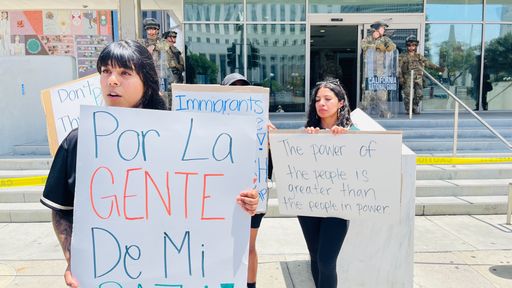Los Angeles, California — The first time the ground shook, it wasn't an earthquake.
It was an armoured vehicle rumbling past Mateo's taco stand near the edge of Fashion District in Los Angeles, where dozens of shopfronts stayed shuttered this week, not from protest but from fear of raids.
Inside the trailer, his cousin Reina was on her second call to her mother in Mexico, speaking in a lowered Spanish.
She paused. Looked outside. A small crowd had gathered near the loading docks. The mood hung low, heavy.
Neither of them had joined the marches, but both gave only their first names and refused to be photographed for this story.
In this part of town, fear wears plain clothes.
Mateo, 34, born at County General, Boyle Heights, raised in Mid-City LA, ran the taco trailer six days a week.
Reina, 26, worked nights at a warehouse in Vernon, stacking boxes of shower products headed for micro-influencers and Midwest chain stores.
They kept to themselves.
'This is what democracy looks like!'
Their stand is close to Santee Alley. Narrow as a secret, loud as a street sermon, it's where downtown Los Angeles comes to bargain for quinceanera gowns, knock-off dolls, glitter heels, and $100 suits that look like they cost $1000.
Pushcart vendors ply bottled water beneath the punishing Californian sun. The place rarely blinks, not for holidays, not for heat.
Post-ICE (US Immigration and Customs Enforcement) raids, things have changed here: shops once brimming with neon and noise shutter their gates early.
Some have hammered up plywood, fearing a repeat of the previous weekend, when protests against ICE raids gave way to hundreds surging through the streets in a blur of rage.
But in Los Angeles, even silence draws suspicion now.
The cousins told TRT World that they had shut the trailer down early on the day protests began in the city. Sirens circled the district like hungry gulls.
Word was spreading: ICE vans had been spotted off San Pedro Street. Federal agents were seen combing several alleys.
Armoured troops and federal officers had moved in on a crowd. Tear gas hissed. Protesters shouted, "This is what democracy looks like!" Bottles flew.
At street level, downtown felt split in two.
On one side, protesters waving flags, Mexico, El Salvador, and Guatemala held the line near Olympic Boulevard. Many protesters saw the flags as defiance against raids, against sweeps, against being made invisible.
On the other hand, shop owners in the Fashion District pulled their shutters down in silence. Raids have gutted many businesses.
Rumours of ICE walking into fabric warehouses and jewellery shops sent whispers crackling.
Latest ICE raids
Mateo said last week his truck was pulled over at 8:47 p.m.
They'd just turned off Alameda when two cruisers boxed them in. Reina's first instinct was to record. Mateo's was to reach for the truck's registration.
Both have legal documents to work in the US.
The officer tapped on the window with his flashlight. Mateo rolled it down.
"Just heading home, sir," he said.
The officer peered inside. Just salsa buckets and a bin of chopped onions.
Mateo said the cops were polite.
They drove the rest of the way in silence.
By morning, Mateo was back at the stand.
US President Donald Trump recently ordered immigration authorities to escalate enforcement efforts in major "Democrat-controlled" cities, with Los Angeles at the epicentre of both political and legal crossfire.
On Thursday, Trump administration's border czar Tom Homan confirmed that immigration raids in the US agriculture and hospitality sectors of the economy will continue despite recent suggestions of a pullback.
Dozens of ICE agents in tactical gear were spotted near the famed Dodger Stadium in LA on Thursday, gathered along the entrance road.
But when they tried to enter the grounds, they were turned away.
The Los Angeles Dodgers confirmed the incident on their official X account, stating the agents were "denied entry" to access the stadium.
Harbouring fragile hope
Even as raids and statements continue to fly, Mateo is faced with little choice but to keep his taco stand open.
He told TRT World that even as violence ensued a mile away, he unlatched the window, checked the propane, and wiped the counter with a vinegar rag.
Reina shows up too.
A siren passed in the distance, but didn't stop.
The cousins worked quietly. The stand saw more silence than customers.
A few regulars came by: an older man in a Dodgers cap and two garment workers on break.
Mateo grilled the carne asada with one eye on the street.
Reina sat on an upside-down crate.
There were no placards. Just a plastic table, a fold-out awning, and two young people keeping the fire lit.
They didn't know if the protests would return or the raids.
They didn't know if the city of their dreams would split again.
But they stayed open.
"We can't do anything big," Reina finally said. "But this is something."




















